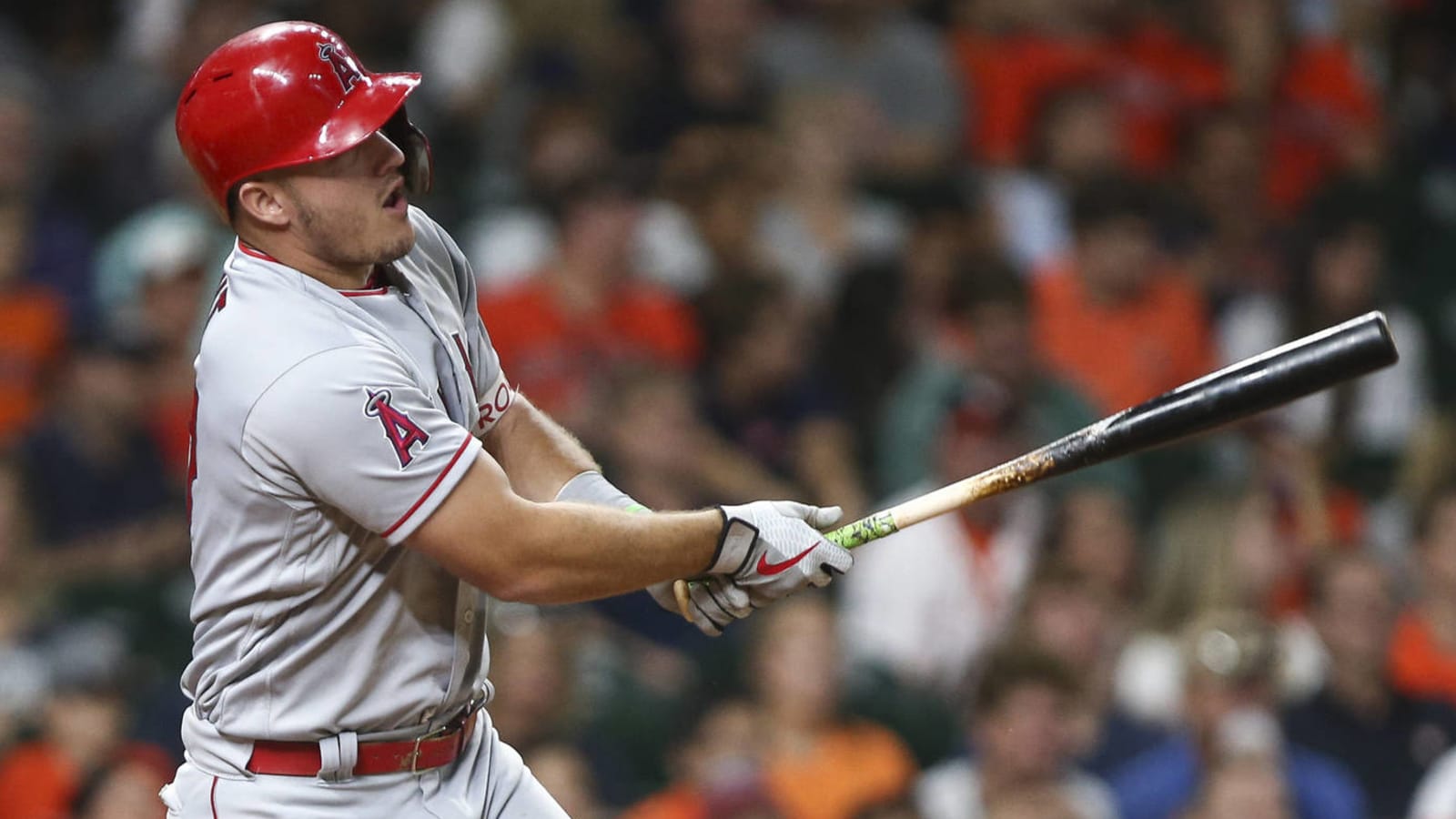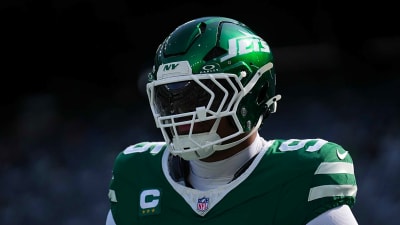Sometimes there are too many great performances in a season for everyone to be recognized. Sometimes the voters get the MVP voting wrong. Whatever the reason, these are the 25 seasons that stand out but failed to win the MLB MVP Award.
Ron Vesely / Major League Baseball / Getty Images
Trout had arguably the greatest rookie season ever but failed to win AL MVP, as Miguel Cabrera hit for the Triple Crown. Trout hit .326-30-83 with 49 steals and a .963 OPS in only 139 games, finishing the year with a 10.5 WAR.
Ronald Martinez / Getty Images
A-Rod had arguably the best season of his career in 2002 but finished second to Miguel Tejada in the AL vote on a non-competitive Rangers team. He hit .300-57-142 with a 1.015 OPS for Texas.
John Zich / AFP / Getty Images
Sosa's 1998 home run chase season is remembered best during his career, but he was even better three years later. Sammy hit .328-64-160 with a 1.174 OPS, but Barry Bonds bested him by hitting .328-73-137 with a 1.379 OPS, breaking Mark McGwire's single-season home run record.
2000: Pedro Martinez
Rich Pilling / Major League Baseball / Getty Images
Martinez won the AL Cy Young but finished just fifth in the AL MVP vote despite putting together arguably the greatest season ever by a pitcher. The Red Sox ace had an 11.7 WAR after going 18-6 with a 1.74 ERA, 0.74 WHIP and 284 strikeouts in 217 innings. He beat out the next closest AL pitcher in ERA by nearly two full runs.
2000: Alex Rodriguez
Henry Ray Abrams / AFP / Getty Images
Rodriguez's final year in Seattle was one to remember, hitting .316-41-132 with a 1.026 OPS and 10.4 WAR. He got only four first-place MVP votes, finishing third behind Jason Giambi and Frank Thomas.
1997: Roger Clemens
Focus on Sport / Getty Images
Clemens easily won the AL Cy Young with Toronto in 1997, but his outstanding performance didn't get much MVP consideration. He finished 10th in the voting but probably deserved a much longer look after earning an 11.9 WAR. He went 21-7 with a 2.05 ERA and 292 strikeouts in 264 innings.
1990: Roger Clemens
Focus on Sport / Getty Images
Not only did Clemens fail to win the MVP in 1990, but he also finished second to Bob Welch in the AL Cy Young vote. Clemens did get three first-place votes for MVP, after going 21-6 with a 1.93 ERA and 209 strikeouts in 228.1 innings. He led the AL with a 10.5 WAR but finished behind Rickey Henderson and Cecil Fielder in the vote.
Ronald C. Modra / Sports Imagery / Getty Images
Gooden got all 24 first-place votes for the NL Cy Young Award but earned just one first-place vote for MVP in 1985. That was despite going 24-4 with a 1.53 ERA, 0.97 WHIP and 268 strikeouts in 276.2 innings for the Mets, helping him produce a historic 12.2 WAR.
1980: Steve Carlton
Focus on Sport / Getty Images
Carlton earned 23 of 24 first-place votes for NL Cy Young but fell well short of MVP, ranking fifth. He went 24-9 with a 2.34 ERA, 1.10 WHIP and 286 strikeouts in 304 innings, earning a 10.2 WAR.
Focus on Sport / Getty Images
Seaver managed to beat out Mike Marshall for NL Cy Young, but he barely saw any MVP consideration. The Mets pitcher finished eighth in the voting after going 19-10 with a 2.08 ERA and 251 strikeouts in 290 innings. His 11.0 WAR still led the league.
1972: Steve Carlton
Focus on Sport / Getty Images
Carlton had one of the best pitching seasons ever in 1972, easily winning the NL Cy Young with all 24 first-place votes. He finished fifth in the MVP vote, though, after going 27-10 with a 1.97 ERA and 310 strikeouts in 346.1 innings.
1972: Gaylord Perry
Bettmann / Getty Images
Like Steve Carlton, Perry won the Cy Young in 1972 but still deserved more MVP consideration. The Cleveland ace went 24-16 with a 1.92 ERA and 29 complete games over 342.2 innings, but he finished just sixth in the MVP balloting.
1971: Fergie Jenkins
Diamond Images / Getty Images
Fergie Jenkins cruised to the NL Cy Young after going 24-13 with a 2.77 ERA and 263 strikeouts in 325 innings for the Cubbies. That tremendous year lacked real MVP consideration, as he finished seventh and Joe Torre nearly swept the first-place votes.
Boston Globe / Getty Images
On-base percentage wasn't appreciated in baseball yet, which is why Yaz's 1968 season got almost no attention. However, he led the AL in walks (119), batting average (.301), on-base percentage (.426) and OPS (.922), resulting in a league-best 10.5 WAR. Still, he hit only 23 home runs and 74 RBI in 157 games, finishing ninth in the MVP vote.
1965: Juan Marichal
Focus on Sport / Getty Images
Marichal didn't win the MLB Cy Young Award, losing out to Sandy Koufax, but he deserved attention for both that award and the NL MVP. The Giants ace finished with a 10.5 WAR after going 22-13 with a 2.13 ERA, 0.91 WHIP and 240 strikeouts in 295.1 innings. He was only ninth in the MVP balloting, but he led the league in shutouts (10) and also had the lowest walk rate in the league.
Bettmann / Getty Images
Mays was hardly considered for the MVP on a fourth-place Giants team, finishing sixth in the voting. His numbers were undeniably elite, hitting .296-47-111 with 19 steals and a .990 OPS. He easily led the league in home runs, slugging and OPS while also winning his eighth straight Gold Glove.
1963: Willie Mays
Bettmann / Getty Images
Mays had yet another all-around spectacular season but finished only fifth in MVP voting. He had a 10.6 WAR after hitting .314-38-103 with a .962 OPS and winning a Gold Glove for the Giants.
1962: Willie Mays
Bettmann / Getty Images
Mays came up short by seven points in the MVP voting to Maury Wills, but Mays clearly deserved to win. The Giants center fielder hit .304-49-141 with a .999 OPS and 10.5 WAR, compared to Wills' 6.0 WAR. He led the league in home runs and total bases while also winning a Gold Glove.
Bettmann / Getty Images
Roger Maris broke Babe Ruth's single-season home run record, but it was teammate Mickey Mantle who had a superior all-around offensive campaign. Mantle hit .317-54-128 with a 1.135 OPS and 10.5 WAR, finishing second in the MVP vote.
1958: Willie Mays
Bettmann / Getty Images
Mays had an amazing 1958 season but finished second in NL MVP voting to Ernie Banks. The Giants center fielder led the league in OPS (1.002) and stolen bases (31) while also winning a Gold Glove. His final line was .347-29-96 and a 10.3 WAR.
1944: Dizzy Trout
Bruce Bennett / Getty Images
Trout had three more first-place MVP votes than teammate Hal Newhouser but still lost out on the award by four points. He had one of the greatest pitching seasons ever, producing an 11.3 WAR after going 27-14 with a 2.12 ERA, 1.13 WHIP and 144 strikeouts in 352.1 innings for the Tigers.
Bettmann / Getty Images
Williams, of the second-place Red Sox, also finished second in the AL MVP vote to Yankee Joe Gordon. In his final season before going off to fight in World War II, Williams hit .356/.499/.648, winning the Triple Crown (.356-36-137) and also leading the league in runs (141), walks (145), on-base and slugging percentage.
1941: Ted Williams
Bettmann / Getty Images
Williams had arguably his best season in 1941, and that's saying a lot for the all-time great. He hit .406-37-120, easily leading the league in batting average, on-base and slugging for a career-best 1.287 OPS. He also led the league with 135 runs and 147 walks but finished second in the AL MVP vote to Joe DiMaggio.
Louis Van Oeyen / WRHS / Getty Images
Gehrig's historically great offensive season earned him only fifth place in the AL MVP voting in 1934. He produced a 10.4 WAR after hitting .363-49-166 with a 1.172 OPS, winning the Triple Crown and finishing first in the AL in OPS.
1912: Walter Johnson
Chicago History Museum / Archive Photos / Getty Images
Johnson's 1912 is on the short list of the greatest pitching seasons ever, but the Washington ace finished only third in the AL MVP vote. He went 33-12 and had a 1.39 ERA, 0.91 WHIP and 303 strikeouts in 369 innings. Johnson finished 34 of his 37 starts and won the ERA title. He left no doubt the following year, topping those numbers with 36 wins and a 1.14 ERA to win MVP.

 +
+

































